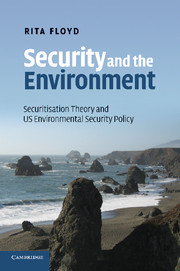Book contents
- Frontmatter
- Contents
- List of tables
- Acknowledgements
- Abbreviations
- Introduction
- 1 The nature of securitisation theory
- 2 A revised securitisation theory
- 3 The rise of US environmental security
- 4 The Clinton administrations and environmental security
- 5 The Bush administrations and environmental security
- 6 The moral evaluation of environmental security
- 7 Conclusion
- Bibliography
- Index
7 - Conclusion
Published online by Cambridge University Press: 05 May 2010
- Frontmatter
- Contents
- List of tables
- Acknowledgements
- Abbreviations
- Introduction
- 1 The nature of securitisation theory
- 2 A revised securitisation theory
- 3 The rise of US environmental security
- 4 The Clinton administrations and environmental security
- 5 The Bush administrations and environmental security
- 6 The moral evaluation of environmental security
- 7 Conclusion
- Bibliography
- Index
Summary
It was the purpose of this book to revise the Copenhagen School's influential securitisation theory so that it both allows insights into the intentions of securitising actors, and permits the moral evaluation of securitisation and desecuritisation in the environmental sector of security. Without doubt, being able to account for why an actor securitised is one of the most important and interesting issues in security analysis. Every time something momentous happens in world politics (for instance, the events of 9/11, or the 2003 invasion of Iraq) friends and family – suddenly remembering what it is that we do for a living – will ask us, why did this happen? Why did they (the terrorists, the states, the statesmen etc.) do this? Surely, they would be astounded if we told them both that security analysts cannot tell them anything meaningful regarding intentions and that we content ourselves with simply analysing who did what exactly, under what circumstances and to what effect. Without doubt they would think that we are only offering half of an analysis, and that one of the most interesting but also challenging tasks to face us is one from which we shy away.
The Copenhagen School's belief that we cannot know anything about a securitising actor's intentions rests, on the one hand, on the conflation of the philosophically distinct concepts of ‘motives’ and ‘intentions’, and, on the other, on an aversion to causal theorising, as associated with positivist analysis.
- Type
- Chapter
- Information
- Security and the EnvironmentSecuritisation Theory and US Environmental Security Policy, pp. 188 - 193Publisher: Cambridge University PressPrint publication year: 2010



